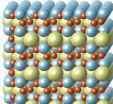(Press-News.org) New Rochelle, NY, February 24, 2014—Over the past three funding stages, the European Commission has invested nearly $475 million in 100 projects in the gene transfer and gene therapy field. David Gancberg, Directorate-General for Research and Innovation, European Commission (Brussels), describes the substantial opportunities for funding to support basic and clinical research in gene and cell therapy to find new treatments for chronic and rare diseases and novel regenerative medicine approaches in a Commentary article in Human Gene Therapy, a peer-reviewed journal from Mary Ann Liebert, Inc., publishers. The article is available free on the Human Gene Therapy website.
Dr. Gancberg and co-author Ruxandra Draghia-Akli state, "More than ever, the European Union offers to the gene and cell therapy sectors the possibilities of financial support to bright and innovative consortia ready to develop, possibly in collaboration with industry, new therapeutic applications to be tested in clinical trials, or novel products for the market, and build sustainable networks of expertise in the field," in their article "Gene and Cell Therapy Funding Opportunities in Horizon 2020: An Overview 2014-2015."
"Funding for gene therapy provided by the European Commission over the last decade has been critical to the current success we are seeing in the clinics. The commentary provided by doctors Gancberg and Draghia-Akli describe exciting new programs." says James M. Wilson, MD, PhD, Editor-in-Chief of Human Gene Therapy, and Director of the Gene Therapy Program, Department of Pathology and Laboratory Medicine, University of Pennsylvania Perelman School of Medicine, Philadelphia.
INFORMATION:
About the Journal
Human Gene Therapy, the official journal of the European Society of Gene and Cell Therapy, British Society for Gene and Cell Therapy, French Society of Cell and Gene Therapy, German Society of Gene Therapy, and five other gene therapy societies, is an authoritative peer-reviewed journal published monthly in print and online. Human Gene Therapy presents reports on the transfer and expression of genes in mammals, including humans. Related topics include improvements in vector development, delivery systems, and animal models, particularly in the areas of cancer, heart disease, viral disease, genetic disease, and neurological disease, as well as ethical, legal, and regulatory issues related to the gene transfer in humans. Its sister journals, Human Gene Therapy Methods, published bimonthly, focuses on the application of gene therapy to product testing and development, and Human Gene Therapy Clinical Development, published quarterly, features data relevant to the regulatory review and commercial development of cell and gene therapy products. Tables of content for all three publications and a free sample issue may be viewed on the Human Gene Therapy website.
About the Publisher
Mary Ann Liebert, Inc., publishers is a privately held, fully integrated media company known for establishing authoritative peer-reviewed journals in many promising areas of science and biomedical research, including Nucleic Acid Therapeutics, Tissue Engineering, Stem Cells and Development, and Cellular Reprogramming. Its biotechnology trade magazine, Genetic Engineering & Biotechnology News (GEN), was the first in its field and is today the industry's most widely read publication worldwide. A complete list of the firm's 80 journals, books, and newsmagazines is available on the Mary Ann Liebert, Inc., publishers website.
Mary Ann Liebert, Inc.
140 Huguenot St., New Rochelle, NY 10801-5215
http://www.liebertpub.com
Phone: (914) 740-2100
(800) M-LIEBERT
Fax: (914) 740-2101
Exclusive David Gancberg article in Human Gene Therapy
on European Commission Funding 2014?
2014-02-24
ELSE PRESS RELEASES FROM THIS DATE:
Volcanoes contribute to recent warming 'hiatus'
2014-02-24
LIVERMORE, Calif. -- Volcanic eruptions in the early part of the 21st century have cooled the planet, according to a study led by Lawrence Livermore National Laboratory. This cooling partly offset the warming produced by greenhouse gases.
Despite continuing increases in atmospheric levels of greenhouse gases, and in the total heat content of the ocean, global-mean temperatures at the surface of the planet and in the troposphere (the lowest portion of the Earth's atmosphere) have shown relatively little warming since 1998. This so-called 'slow-down' or 'hiatus' has received ...
Personalized medicine best way to treat cancer, study argues
2014-02-24
If a driver is traveling to New York City, I-95 might be their route of choice. But they could also take I-78, I-87 or any number of alternate routes. Most cancers begin similarly, with many possible routes to the same disease. A new study found evidence that assessing the route to cancer on a case-by-case basis might make more sense than basing a patient's cancer treatment on commonly disrupted genes and pathways.
The study found little or no overlap in the most prominent genetic malfunction associated with each individual patient's disease compared to malfunctions ...
On the road to Mottronics
2014-02-24
"Mottronics" is a term seemingly destined to become familiar to aficionados of electronic gadgets. Named for the Nobel laureate Nevill Francis Mott, Mottronics involve materials – mostly metal oxides - that can be induced to transition between electrically conductive and insulating phases. If these phase transitions can be controlled, Mott materials hold great promise for future transistors and memories that feature higher energy efficiencies and faster switching speeds than today's devices. A team of researchers working at Berkeley Lab's Advanced Light Source (ALS) have ...
New ideas change your brain cells: UBC research
2014-02-24
A new University of British Columbia study identifies an important molecular change that occurs in the brain when we learn and remember.
Published this month in Nature Neuroscience, the research shows that learning stimulates our brain cells in a manner that causes a small fatty acid to attach to delta-catenin, a protein in the brain. This biochemical modification is essential in producing the changes in brain cell connectivity associated with learning, the study finds.
In animal models, the scientists found almost twice the amount of modified delta-catenin in the brain ...
Bushfires continue to plague Victoria, Australia
2014-02-24
Reports coming from Australia are more positive than negative now with regards to the Morwell fire, but officials say they still have a "long way to go." Considerable progress has been made in extinguishing the fire, but there is still significant heat that continues to generate smoke from the open mine. Fire activity has been cut in half since February 11, but there are still "weeks of firefighting ahead" according to Craig Lapsley, Fire Services Commissioner on the County Fire Authority website.
According to the Australian News, "The [Morwell] fire, which started ...
Study of Hispanic/Latino health presents initial findings
2014-02-24
February 24, 2014 – (BRONX, NY) –One in every six people in the U.S. is Hispanic/Latino and as a group they live longer than non-Hispanic whites (81.4 years vs. 78.8 years). Yet, despite their strong representation and relative longevity, little is understood about this group's health conditions and behaviors.
The Hispanic Community Health Study/Study of Latinos (HCHS/SOL), the landmark research study of Hispanic/Latino health funded by the National Institutes of Health (NIH), has released initial findings that show significant variations in disease prevalence and health ...
Researcher builds a better job performance review
2014-02-24
MANHATTAN -- A critical job performance evaluation can have a negative effect on any employee, a Kansas State University researcher has found.
By studying how people view positive or negative feedback, Satoris Culbertson, assistant professor of management, has determined that nobody -- even people who are motivated to learn -- likes negative performance reviews. Culbertson is developing ways to help managers improve the process for reviewing employees.
Culbertson and collaborators at Eastern Kentucky University and Texas A&M University surveyed more than 200 staffers ...
Now it will become cheaper to make second-generation biofuel for our cars
2014-02-24
Producing second-generation biofuel from dead plant tissue is environmetally friendly - but it is also expensive because the process as used today needs expensive enzymes, and large companies dominate this market. Now a Danish/Iraqi collaboration presents a new technique that avoids the expensive enzymes. The production of second generation biofuels thus becomes cheaper, probably attracting many more producers and competition, and this may finally bring the price down.
The world's need for fuel will persist, also when the Earth's deposits of fossil fuels run out. Bioethanol, ...
Biomedical bleeding affects horseshoe crab behavior
2014-02-24
DURHAM, N.H. – New research from Plymouth State University and the University of New Hampshire indicates that collecting and bleeding horseshoe crabs for biomedical purposes causes short-term changes in their behavior and physiology that could exacerbate the crabs' population decline in parts of the east coast.
Each year, the U.S. biomedical industry harvests the blue blood from almost half a million living horseshoe crabs for use in pharmaceuticals — most notably, a product called Limulus amebocyte lysate (LAL), used to ensure vaccines and medical equipment are free ...
Significant discrepancies between FISH and IHC results for ALK testing
2014-02-24
DENVER –The findings of a recent study indicate that routine testing with both fluorescent in situ hybridization (FISH) and immunohistochemistry (IHC) may enhance the detection of ALK-positive non-small cell lung cancer (NSCLC). Accurate determination of ALK-positive tumors is necessary to identify patients with advanced NSCLC who are most likely to benefit from targeted therapy with an ALK inhibitor.
The discovery of ALK rearrangement in about 1% to 7% of NSCLCs led to the development of ALK inhibitors, such as crizotinib, which have significantly improved treatment ...
LAST 30 PRESS RELEASES:
2026 Young Investigators: ONR celebrates new talent tackling warfighter challenges
Genetics help explain who gets the ‘telltale tingle’ from music, art and literature
Many Americans misunderstand medical aid in dying laws
Researchers publish landmark infectious disease study in ‘Science’
New NSF award supports innovative role-playing game approach to strengthening research security in academia
Kumar named to ACMA Emerging Leaders Program for 2026
AI language models could transform aquatic environmental risk assessment
New isotope tools reveal hidden pathways reshaping the global nitrogen cycle
Study reveals how antibiotic structure controls removal from water using biochar
Why chronic pain lasts longer in women: Immune cells offer clues
Toxic exposure creates epigenetic disease risk over 20 generations
More time spent on social media linked to steroid use intentions among boys and men
New study suggests a “kick it while it’s down” approach to cancer treatment could improve cure rates
Milken Institute, Ann Theodore Foundation launch new grant to support clinical trial for potential sarcoidosis treatment
New strategies boost effectiveness of CAR-NK therapy against cancer
Study: Adolescent cannabis use linked to doubling risk of psychotic and bipolar disorders
Invisible harms: drug-related deaths spike after hurricanes and tropical storms
Adolescent cannabis use and risk of psychotic, bipolar, depressive, and anxiety disorders
Anxiety, depression, and care barriers in adults with intellectual and developmental disabilities
Study: Anxiety, gloom often accompany intellectual deficits
Massage Therapy Foundation awards $300,000 research grant to the University of Denver
Gastrointestinal toxicity linked to targeted cancer therapies in the United States
Countdown to the Bial Award in Biomedicine 2025
Blood marker from dementia research could help track aging across the animal world
Birds change altitude to survive epic journeys across deserts and seas
Here's why you need a backup for the map on your phone
ACS Central Science | Researchers from Insilico Medicine and Lilly publish foundational vision for fully autonomous “Prompt-to-Drug” pharmaceutical R&D
Increasing the number of coronary interventions in patients with acute myocardial infarction does not appear to reduce death rates
Tackling uplift resistance in tall infrastructures sustainably
Novel wireless origami-inspired smart cushioning device for safer logistics
[Press-News.org] Exclusive David Gancberg article in Human Gene Therapyon European Commission Funding 2014?





